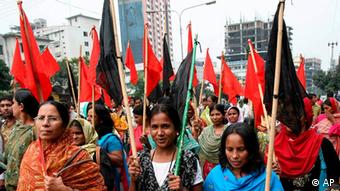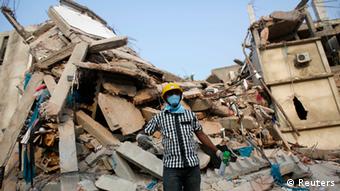The US announcement it would suspend long-term trade benefits for Bangladesh has triggered heavy criticism in the South Asian nation. Experts examine the impact the move might have on the country’s economy.
US President Barack Obama recently announced he intended to suspend Bangladesh’s trade benefits under the Generalized System of Preferences (GSP) that allowed zero or reduced tariffs on some imported products. He cited the lack of support for “internationally recognized worker rights.”
While the GSP program does not include the garment industry, the cut means that importers of other Bangladeshi products will now have to pay duties to bring them into the US. Bangladesh had been able to export to the United States nearly 5,000 types of items without paying import tariffs.
According to data provided by the US Council on Foreign Relations (CFR), the duty suspensions saved US importers last year about $2 million on roughly $35 million worth of Bangladeshi imports, mostly in tobacco, sporting equipment, kitchenware and plastic products.
There is still no specific timetable as to how long the suspension of trade benefits will last. But US trade expert Edward Alden believes Bangladesh will clearly have to make some concrete improvements before the US reconsiders.
“Several members of Congress have spelled out a list of needed improvements, including: enforcing building and fire safety codes; affording workers the right to refuse to work in unsafe buildings; defending workers from retaliation if they attempt to unionize.”
Although Obama’s announcement may not be directed at the country’s textile industry, this does seem to be the most dangerous one for workers. The move comes after a series of deadly incidents in Bangladeshi garment factories including the collapse of an eight-story building housing five garment factories, which claimed the lives of over 1,000 people on April 24 .
The incidents shifted global attention on the industry’s hazardous conditions and triggered renewed scrutiny of “made-in-Bangladesh” clothes commonly sold in the West. Labor safety standards in the country’s 20-billion-dollar industry are lax and minimum wages for garment workers are among the lowest in the world, at around 3,000 takas (38 US dollars) per month.
An embarrassment for Dhaka
The decision also comes as an embarrassment to the government in Dhaka which had already announced a string of safety measures after the collapse of the Rana Plaza garment factory complex. “It cannot be more shocking for the factory workers of Bangladesh that the decision to suspend GSP comes at a time when the government of Bangladesh has taken concrete and visible measures to improve factory safety and protect workers’ rights,” a foreign ministry statement said.
The government’s slow response to improve safety standards has drawn criticism from Bangladeshi experts. Economist Khondokar Golam Moazzem, from the Dhaka-based Centre for Policy Dialogue (CPD), slammed the government and the garment producers for failing to play an effective role to avoid the current situation. “If they had given enough importance to the issue, then Bangladesh would not be facing a decision like the cancellation of the GSP today,” Moazzem told DW.
Who is really behind the cancellation?
Experts fear that trade benefit cuts will not only affect the country’s economy but also the workers themselves. There are some who believe there is more behind the US decision than just Washington’s will to improve worker’s safety and rights. Jagdish Bhagwati, professor of Economics at Columbia University, told DW the Obama administration was deeply indebted to US labor unions, particularly to their federation AFL-CIO, which “fears competition from poor countries” because they believe “trade with poor countries such as Bangladesh will produce paupers in the rich countries.”
These unions, Bahgwati said, “now see in the safety outrage their chance to use GSP to unionize the Bangladeshi workers, thereby raising wages and hence prices and reducing effective competition for themselves.” The increase in wages and prices would only reduce foreign demand for Bangladeshi garments, “hurting the very workers that the US labor lobbies pretend to want to help,” he added.
A largely ‘symbolic’ move
US trade expert Alden believes, on the other hand, that the immediate consequences will be limited: “The move is largely a symbolic one that will have no effect on the Bangladeshi textile industry, since textiles are not currently eligible for American GSP preferences.” The senior CFR fellow said that the US imported nearly $5 billion in Bangladeshi textile products, and collected over $700 million in tariffs. “Bangladesh is an extremely low-cost producer, and is competitive even with the high tariffs that are charged by the US.”
Will the EU follow suit?
“The greater danger for Bangladesh,” Alden said, “is if the European Union were to take the same action, since most Bangladesh textile exports are duty-free to Europe.”
But unlike US companies, some of the big European apparel makers that source from Bangladesh (H&M, Carrefour, Mark’s and Spencer’s) have signed a binding agreement with unions and non-governmental organizations to invest in improving worker safety in the country.
Some experts believe most countries will leave it to consumers to decide whether they should follow the US example. Holger Görg, professor of International Economics at the University of Kiel, says a European cut in trade benefits is not likely. “Hitting one of the poorest countries with a suspension of trade privileges does not make much sense, as it would probably hurt the poorest workers in the country, namely those that rely on their income from working in the textile companies,” Görg told DW.
Source: dw.de













